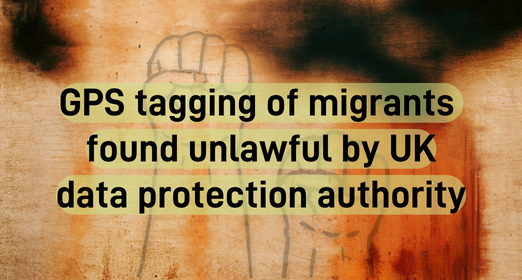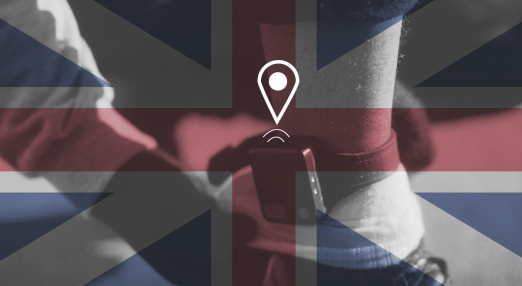Privacy International
Filter by...
-

Non-fitted devices in the UK Home Office’s surveillance arsenal: Investigating the technology behind GPS fingerprint scanners
Privacy International’s technical research on the so-called non-fitted devices (NFDs) used by the UK Home Office to track migrants shows that these devices are intrusive and stigmatising by design. The use of NFDs is an expansion beyond the use of GPS ankle tags of the UK’s surveillance of migrants who are on immigration bail and subject to electronic monitoring conditions.
Read more
-

GPS tagging of migrants found unlawful by UK data protection authority
As a result of Privacy International’s 2022 complaint against the UK Home Office, the UK data protection authority (ICO) has found that the GPS tagging of migrants and asylum seekers arriving to the UK small boats was unlawful, and issued a formal warning for all future data protection compliance of GPS tagging as a whole. This is a major step towards better scrutiny of the human rights implications of the surveillance of migrants.
Read more
-

Warnings from the UK: 24/7 racialised GPS surveillance
Campaigners assembled outside Capita PLC’s Annual General Meeting in the City of London on Thursday 11 May are contesting the outsourcing company’s £114m contract to deliver 24/7 GPS monitoring services, used by the Home Office to surveil people without British citizenship.
Read more
-

EU watchdog finds European Commission failed to protect human rights from its surveillance aid to African countries
The European Ombudsman has found that the European Commission failed to take necessary measures to ensure the protection of human rights in the transfers of technology with potential surveillance capacity supported by its multi-billion Emergency Trust Fund for Africa.
Read more
-

Securing privacy: Privacy International on end-to-end encryption
EDRi member Privacy International's (PI) report on end-to-end encryption (E2EE) analyses and defends expanding the use of E2EE to protect our communications. It defines E2EE, delves into its human rights implications, briefly addresses some prominent proposals for government access to E2EE content, and concludes with PI’s recommendations regarding E2EE.
Read more
-

Identity Crisis
Identity systems create and facilitate exclusion, insecurity, and surveillance.
Read more
-

WFH – Watched from Home: Office 365 and workplace surveillance creep
In the past few years, the pandemic and the shift to working from home have bolstered the use of remote surveillance software to monitor employees. In 2020, global demand for employee monitoring software increased 108 per cent by April and 70 per cent by May 2020 compared to pre-pandemic times. At the same time, search engine queries for "How to monitor employees working from home" increased by 1,705 per cent in April and 652 per cent in May 2020 compared to the previous year.
Read more
-

Challenging the use of GPS tags to monitor asylum seekers in the UK
The latest rollout of GPS tags to monitor migrants is another step in creating a 'hostile environment' for asylum seekers in the UK.
Read more
-

Personal data and competition: Mapping perspectives, identifying challenges and enhancing engagement for competition regulators and civil society
This report seeks to map the attitudes and perspectives of competition regulators and civil society across the world with regard to personal data and competition.
Read more
-

Electronic monitoring using GPS tags: a tech primer
Electronic tags have been a key part of criminal justice for many years throughout the world. As traditional radio-frequency tags are replaced by GPS ankle tags, we examine how these different technologies work and the seismic shift that will result from 24/7 location monitoring and data analytics, enabled by GPS tags.
Read more
-

The ICO provisionally issues £17 million fine against facial recognition company Clearview AI
Following EDRi member Privacy International's (PI) submissions before the UK Information Commissioner's Office (ICO), as well as other European regulators, the ICO has announced its provisional intent to fine Clearview AI.
Read more
-

How a company illegally exploited the data of 14 million mothers and babies
If you’re in the UK you may know Bounty by the packs of samples they distribute to pregnant women at midwife apps. You might not know that they were also found to have illegally shared data of +14 million mums and babies with 39 companies. Bounty collected personal data from a variety of channels both online and offline: its website, mobile app.
Read more
